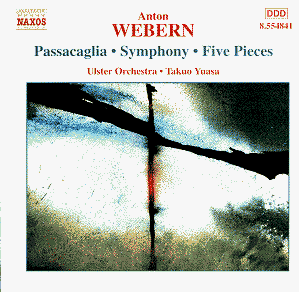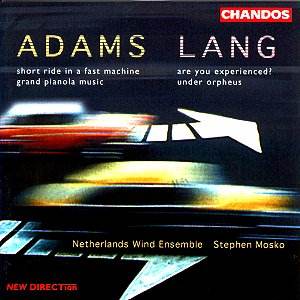 Composer: Anton Webern
Composer: Anton Webern
Works: Passacaglia, Opus 1; Five Movements for Strings, Opus 5; Six Pieces, Opus 6; Five Pieces, Opus 10; Symphony, Opus 21; Variations, Opus 30
Performers: Ulster Orchestra, Takuo Yuasa (conductor)
Recording: 29-30 March 2000, Ulster Hall, Belfast
Label: NAXOS 8.554841
Anton Webern occupies a singular place in the pantheon of 20th-century music, celebrated not only for his pivotal role in the development of serialism but also for his profound ability to convey emotional depth within the constraints of a highly economical compositional style. This Naxos release encapsulates the evolution of Webern’s artistry, from the lush romanticism of his early works to the stark, sophisticated structures of his later compositions. The disc serves as a compelling anthology of Webern’s oeuvre, showcasing how his artistic journey reflects broader shifts in the musical landscape of the early 20th century.
The recording opens with the Passacaglia, Opus 1, a work that retains a rich, lyrical quality reminiscent of Mahler and Brahms. Yuasa and the Ulster Orchestra bring a warmth and expressiveness to the strings, creating an atmospheric tapestry that sets the stage for Webern’s subsequent, more radical explorations. The lush, arching phrases are executed with a sensitivity that highlights the romantic undertones of the piece. As we transition to the Five Movements for Strings, Opus 5, the orchestra’s performance becomes more subtle and fragmented, mirroring the composer’s shift towards atonality. Here, the precision of the ensemble becomes paramount, with each movement revealing Webern’s intricate textures and timbral explorations.
Yuasa’s interpretative choices are particularly noteworthy in the Six Pieces, Opus 6, where the conductor navigates the delicate balance between clarity and intensity. The funeral march, an emotional high point, builds with a crescendo that is both haunting and compelling. The orchestra’s control of dynamics is exemplary, allowing the music’s inherent tension to resonate powerfully. In contrast, the Symphony, Opus 21 and Variations, Opus 30 showcase a more rigorous structural integrity, where Yuasa adeptly manages the complex interrelations of timbre and rhythm. The orchestra exhibits remarkable cohesion, each section contributing to Webern’s intricate web of sound.
The sound quality of this recording deserves commendation. The ambient acoustics of the Ulster Hall enhance the orchestral textures, providing a clarity that allows the listener to appreciate Webern’s meticulous attention to detail. The engineering captures the subtle nuances without sacrificing the overall dynamism of the performance. While comparisons to legendary interpretations, such as those by Karajan and the Berlin Philharmonic, may suggest a higher level of sophistication, Yuasa’s approach is refreshingly direct and emotionally unadorned, inviting the listener to engage with Webern’s music on its own terms.
The disc is further enriched by Richard Whitehouse’s insightful liner notes, which provide a thorough historical context and elucidate the significance of Webern’s innovations. This scholarly approach complements the listening experience, grounding the music in its historical and aesthetic framework.
This recording stands as a significant contribution to the discography of Anton Webern, offering a comprehensive view of his compositional evolution. The Ulster Orchestra, under Takuo Yuasa’s insightful direction, delivers an interpretation that is both refined and deeply felt, making this disc a valuable addition for both aficionados of modern music and those seeking to understand Webern’s enduring impact on the canon of Western art music.



